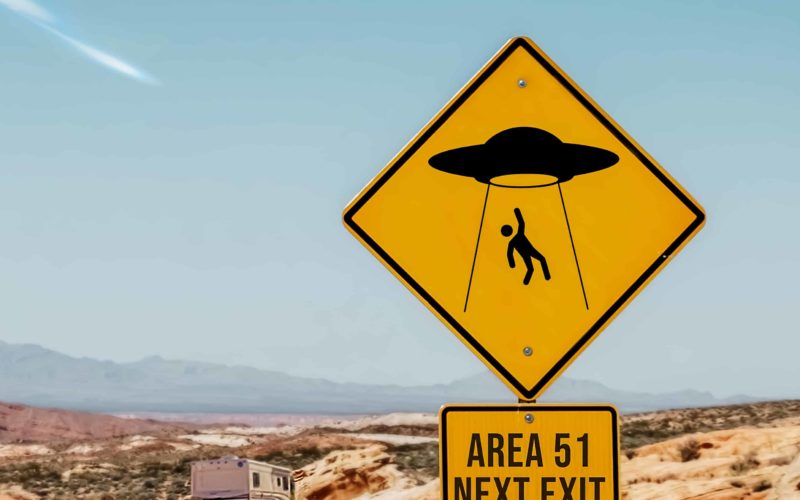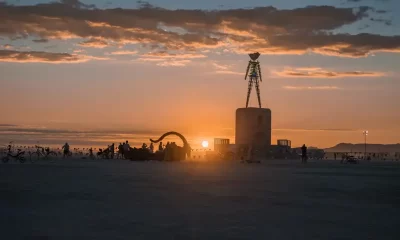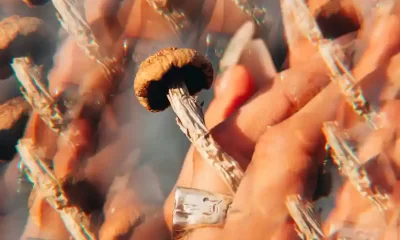Business
Brian Moreno Thinks Differently About Aliens And So Should You

The comedian and filmmaker chats about aliens, his new documentary Dreamland: A Storming Area 51 Story, and how growing cannabis plants is a lot like making a movie.
In late September 2019, a group of individuals banded together around a Facebook event to breach the heavily guarded gates that surround the enigmatic structure known as Area 51. Among those in attendance were comedian, writer, and director Brian Moreno who had hired a cast and crew to capture footage of the experience.
In his new film Dreamland: A Storming Area 51 Story starring Moreno and fellow comedians Andy Kozel, Giff Pippin, and Natasha Pearl Henson, Moreno unpacks the origins of the event and what really went on during those mysterious fall days in Nevada.
When we connect by phone, Brian is optimistic the movie will be well received and divulges some of his filmmaking processes, his affinity for the term “alien,” and why he thinks being on stage and making movies is similar to cannabis horticulture.

High Times: You have been a comedian for most of your professional career. Where did the drive to be a filmmaker come from?
Brian Moreno: The first thing I ever wanted in the entertainment industry was to be a filmmaker. Being a comedian was actually secondary.
Like most young people, at first I thought I was going to be a famous, groundbreaking actor. When that doesn’t pan out for you as quickly as it does in your mind, I started to spread my wings and get into comedy and comedy just took over. When you’re a working comedian and traveling, it’s really hard to do anything else.
I’d had some success making short-form videos and knew the only way I’d get respect as a filmmaker would be to actually make a film. Something like Dreamland—a run-and-gun type shoot—with a story that was only in my brain, you’re not going to get funding for it unless you have some sort of proof-of-concept. And I didn’t. So I had the idea and it snowballed from idea into a film.
You say in the trailer you “Ended up making a movie you didn’t intend to make.” Do you feel that way with the final product?
That’s a line in the movie I think about all of the time. When I cried in that scene, I was overwhelmed because I knew with [the footage] I had, I could make a movie. I didn’t know if it was going to be the movie I envisioned because this is a feel-good documentary. As much as it is a comedy and a documentary, it’s a feel-good documentary, and you don’t find many of those.
Because this is a comedy, people are going to look at it differently, but I think to tell a story like the one we did, it’s not even about the storming of Area-51, it’s more about different colors of the rainbow coming together. The storming of Area-51 is just a vehicle that drives the story.
In that way, Area-51 is more of a backdrop than anything else.
Yeah, so that’s why if you’re into aliens, UFO-ology, or Area-51—or none of that—there’s something in this movie for you.

Aliens have long been associated with your persona. How did your fascination with aliens originate?
I try to explain this to people all the time. My fascination with aliens was never because of aliens. What attracted me to the word “alien” and why I always had an association with “alien” is because it means “foreign” or “different.” I always felt foreign or different compared to my surroundings, so that’s where the “alien” moniker came from.
As I became more and more informed about the mysteries of our universe, the alien theme and subject kept coming back up. A lot of people think I started out as an alien lover—and as much as I am an alienhead and UFO-lover—it all started out with the word “alien” just meaning “different.” That’s what I felt I related to the most.
With that being said, Dreamland I believe is one of the most comprehensive UFO documentaries—that’s also entertaining—that’s ever been made. A lot of the information I try to pack under the guise of comedy or within the storyline was done on purpose so that every individual character could represent a color of the ufology rainbow.
There are the people who are in total disbelief, there are people who just kind of dabble, there are people who think there might be a little bit of life out there but don’t exactly know what, and there are people who are hardcore believers. The parallel I try to make in the movie is that the people who believe in the UFOs and aliens and the space beings—there’s a parallel to what they’re doing and anyone who is religious. You can believe whatever you want, but if you put your faith into religion, you’re putting your faith into something that’s unseen, not understood, and can’t be explained. A lot of that is just blind faith in the same way a lot of these UFO enthusiasts believe. No matter where you stand on aliens or UFOs, there should be a relatable character to your point of view.
So the way into the movie for most will be through the characters, not so much from the alien-ness of it all.
Absolutely, and I think people will pick up on that immediately because of the Blair-Witchean way I open the movie, where it almost seems like it’s found footage.
However, there are people and there are critics. All of the test audiences who have screened the film seem to get it [and get the humor] but are the critics going to get it? I don’t know. It’s a really great question.
I am a cinephile and in terms of genre, this movie is cinéma vérité, which is basically the art of making a movie so that the audience feels like they’re a fly on the wall. That’s how this was made.
As much as it’s anxiety-inducing not knowing how the film will be received, at the same time, it’s got to feel pretty cool that it’s in its final form.
It does, but also—and maybe this is what made me a decent comic—I’m always thinking about what’s next or what I could do better. So yes, it is cool, and taking those moments to realize that is very important. I don’t know if I do that enough.
In terms of those moments, talk a bit more about the moment you realized you actually had something worthwhile.
It was the last night before we wrapped shooting and I knew I had an interesting film. But once I had the news footage added to [the edit], I knew for sure [the film] was worthy of distribution.
There are three elements to this story: The road trip, the news footage, and the interviews. Once I had that layered properly, I knew I had a real movie that told a full story, it just took two years to get there.
How similar or different is ‘Brian Moreno’ in the movie to Brian Moreno in real life?
I think the best way to describe it would be to compare it to the ‘Brian’ who is on stage as a comedian to the ‘Brian’ that’s in real life.
When I’m on stage and who I play in the movie—it’s pretty close to real—but there are aspects of oneself that when the camera goes on or the stage lights come on you, you tend to highlight or suppress. So there’s a character aspect to it, but I would say a lot of it is me just acting like me, if that makes any sense.
For this to be a real documentary, one of the things I really had to hit on was that there wasn’t a script and I wasn’t really coaching the players. I allowed the players to play within the framework of the universe that I’d built. So whomever it may be that you’re watching in the movie, they’re playing a character of themselves because the camera is on and these are the choices that they are making. What is “real” anymore? I don’t know.

In terms of “reality,” how did psychedelics and cannabis play a role in your creative process and the making of this film, and how were both referenced within the movie itself?
I’m a longtime believer in what cannabis can do for the creative process. This movie, however, was a little bit more dependent on the mushrooms that were taken the final night of shooting.
The movie was a very run-and-gun type shoot where the crew had no idea what to do until I told them. The first night, there was a lot of stress in getting set up because getting [to Area 51] was so daunting and we got there so late. We then shot the entire next day with everyone sober, with the exception of a few people from whom I had to hide the liquor. I had brought weed and mushrooms with me because I knew if I could have a bonding experience with everyone on the crew, the testimonials that they would give from day one to day two would be a one-hundred-and-eighty-degrees difference.
The crew believed me that we had a movie, so that was good enough for them to loosen up. The [cannabis and mushroom-fueled] experience that we all had together…I don’t talk to some of the cast and crew anymore, but I know that’s a memory they’ll never forget. The next morning when they got interviewed, you can really see the difference in not only perspective—which I think mushrooms help with—but you can see the difference in the way they would speak about an event that was a bust.
Let me be clear, a lot of people are going to be like, “Oh, that event was a bust.” Yes, this is a failure story, but there are so many little successes within the overall failure.
I think the mushrooms and the weed were responsible for the cast and crew coming together not only as a family, but as one cohesive unit. It’s why I think everyone should trip mushrooms at least once a year—because it helps clear out the ego. If you see the difference in the testimonials from the cast and crew from day one to day two, the biggest difference is the removal of ego. When you see that transformation, it’s actually a beautiful thing, and is some of the subtext within this documentary.
Filmmaking aside, you’re also a cannabis plant-dad these days, is that accurate?
Oh totally. I’ve been attempting to grow weed ever since I was picking out little stems and seeds back in my college years. The thing about cultivation is it used to be so difficult and there used to be so many obstacles to overcome to be able to grow your own weed—and grow it well.
Now, in states that are legal—and this is one of the reasons why Amazon is pushing for legality—there’s a huge market for all of the cultivation equipment and gear. I’m big into gardening and horticulture and believe anyone who enjoys partaking [in weed] should try growing a plant or two in the summer because It’s a really cool plant to see grow. If you told me it came from aliens I would totally believe it.
Is there a correlation between the skills required to grow buds, perform comedy, and make a movie? Are any of the skills transferable?
Absolutely. With biology and growing you have to remember that sometimes there are so many factors out of your control—just like in comedy, just like in making movies. You just have to let the universe take its course. You have to be able to let go of the reins and trust. Trust your instincts, trust other people—you have to constantly learn from your mistakes.
There are only a few things I think I’m good at in this world: Telling stories, growing things, and making jokes. All of those things take a lot of thought, time, and effort, and it’s all very much like planting a seed. You water it, you let it be, and then you come back to it. You pluck a few leaves and maybe you give it some fertilizer. Then you have to leave it alone again for a little bit. You can’t obsess over it because then you’ll suffocate it. The gestation of a seed is very much like the gestation of an idea, a joke, or a movie.
Source: https://hightimes.com/news/nevada/brian-moreno-thinks-differently-about-aliens-and-so-should-you/
Business
New Mexico cannabis operator fined, loses license for alleged BioTrack fraud

New Mexico regulators fined a cannabis operator nearly $300,000 and revoked its license after the company allegedly created fake reports in the state’s traceability software.
The New Mexico Cannabis Control Division (CCD) accused marijuana manufacturer and retailer Golden Roots of 11 violations, according to Albuquerque Business First.
Golden Roots operates the The Cannabis Revolution Dispensary.
The majority of the violations are related to the Albuquerque company’s improper use of BioTrack, which has been New Mexico’s track-and-trace vendor since 2015.
The CCD alleges Golden Roots reported marijuana production only two months after it had received its vertically integrated license, according to Albuquerque Business First.
Because cannabis takes longer than two months to be cultivated, the CCD was suspicious of the report.
After inspecting the company’s premises, the CCD alleged Golden Roots reported cultivation, transportation and sales in BioTrack but wasn’t able to provide officers who inspected the site evidence that the operator was cultivating cannabis.
In April, the CCD revoked Golden Roots’ license and issued a $10,000 fine, according to the news outlet.
The company requested a hearing, which the regulator scheduled for Sept. 1.
At the hearing, the CCD testified that the company’s dried-cannabis weights in BioTrack were suspicious because they didn’t seem to accurately reflect how much weight marijuana loses as it dries.
Company employees also poorly accounted for why they were making adjustments in the system of up to 24 pounds of cannabis, making comments such as “bad” or “mistake” in the software, Albuquerque Business First reported.
Golden Roots was fined $298,972.05 – the amount regulators allege the company made selling products that weren’t properly accounted for in BioTrack.
The CCD has been cracking down on cannabis operators accused of selling products procured from out-of-state or not grown legally:
- Regulators alleged in August that Albuquerque dispensary Sawmill Sweet Leaf sold out-of-state products and didn’t have a license for extraction.
- Paradise Exotics Distro lost its license in July after regulators alleged the company sold products made in California.
Golden Roots was the first alleged rulebreaker in New Mexico to be asked to pay a large fine.
Source: https://mjbizdaily.com/new-mexico-cannabis-operator-fined-loses-license-for-alleged-biotrack-fraud/
Business
Marijuana companies suing US attorney general in federal prohibition challenge

Four marijuana companies, including a multistate operator, have filed a lawsuit against U.S. Attorney General Merrick Garland in which they allege the federal MJ prohibition under the Controlled Substances Act is no longer constitutional.
According to the complaint, filed Thursday in U.S. District Court in Massachusetts, retailer Canna Provisions, Treevit delivery service CEO Gyasi Sellers, cultivator Wiseacre Farm and MSO Verano Holdings Corp. are all harmed by “the federal government’s unconstitutional ban on cultivating, manufacturing, distributing, or possessing intrastate marijuana.”
Verano is headquartered in Chicago but has operations in Massachusetts; the other three operators are based in Massachusetts.
The lawsuit seeks a ruling that the “Controlled Substances Act is unconstitutional as applied to the intrastate cultivation, manufacture, possession, and distribution of marijuana pursuant to state law.”
The companies want the case to go before the U.S. Supreme Court.
They hired prominent law firm Boies Schiller Flexner to represent them.
The New York-based firm’s principal is David Boies, whose former clients include Microsoft, former presidential candidate Al Gore and Elizabeth Holmes’ disgraced startup Theranos.
Similar challenges to the federal Controlled Substances Act (CSA) have failed.
One such challenge led to a landmark Supreme Court decision in 2005.
In Gonzalez vs. Raich, the highest court in the United States ruled in a 6-3 decision that the commerce clause of the U.S. Constitution gave Congress the power to outlaw marijuana federally, even though state laws allow the cultivation and sale of cannabis.
In the 18 years since that ruling, 23 states and the District of Columbia have legalized adult-use marijuana and the federal government has allowed a multibillion-dollar cannabis industry to thrive.
Since both Congress and the U.S. Department of Justice, currently headed by Garland, have declined to intervene in state-licensed marijuana markets, the key facts that led to the Supreme Court’s 2005 ruling “no longer apply,” Boies said in a statement Thursday.
“The Supreme Court has since made clear that the federal government lacks the authority to regulate purely intrastate commerce,” Boies said.
“Moreover, the facts on which those precedents are based are no longer true.”
Verano President Darren Weiss said in a statement the company is “prepared to bring this case all the way to the Supreme Court in order to align federal law with how Congress has acted for years.”
While the Biden administration’s push to reschedule marijuana would help solve marijuana operators’ federal tax woes, neither rescheduling nor modest Congressional reforms such as the SAFER Banking Act “solve the fundamental issue,” Weiss added.
“The application of the CSA to lawful state-run cannabis business is an unconstitutional overreach on state sovereignty that has led to decades of harm, failed businesses, lost jobs, and unsafe working conditions.”
Business
Alabama to make another attempt Dec. 1 to award medical cannabis licenses

Alabama regulators are targeting Dec. 1 to award the first batch of medical cannabis business licenses after the agency’s first two attempts were scrapped because of scoring errors and litigation.
The first licenses will be awarded to individual cultivators, delivery providers, processors, dispensaries and state testing labs, according to the Alabama Medical Cannabis Commission (AMCC).
Then, on Dec. 12, the AMCC will award licenses for vertically integrated operations, a designation set primarily for multistate operators.
Licenses are expected to be handed out 28 days after they have been awarded, so MMJ production could begin in early January, according to the Alabama Daily News.
That means MMJ products could be available for patients around early March, an AMCC spokesperson told the media outlet.
Regulators initially awarded 21 business licenses in June, only to void them after applicants alleged inconsistencies with how the applications were scored.
Then, in August, the state awarded 24 different licenses – 19 went to June recipients – only to reverse themselves again and scratch those licenses after spurned applicants filed lawsuits.
A state judge dismissed a lawsuit filed by Chicago-based MSO Verano Holdings Corp., but another lawsuit is pending.
Source: https://mjbizdaily.com/alabama-plans-to-award-medical-cannabis-licenses-dec-1/
-

 Business2 years ago
Business2 years agoPot Odor Does Not Justify Probable Cause for Vehicle Searches, Minnesota Court Affirms
-

 Business2 years ago
Business2 years agoNew Mexico cannabis operator fined, loses license for alleged BioTrack fraud
-

 Business2 years ago
Business2 years agoAlabama to make another attempt Dec. 1 to award medical cannabis licenses
-

 Business2 years ago
Business2 years agoWashington State Pays Out $9.4 Million in Refunds Relating to Drug Convictions
-

 Business2 years ago
Business2 years agoMarijuana companies suing US attorney general in federal prohibition challenge
-

 Business2 years ago
Business2 years agoLegal Marijuana Handed A Nothing Burger From NY State
-

 Business2 years ago
Business2 years agoCan Cannabis Help Seasonal Depression
-

 Blogs2 years ago
Blogs2 years agoCannabis Art Is Flourishing On Etsy













